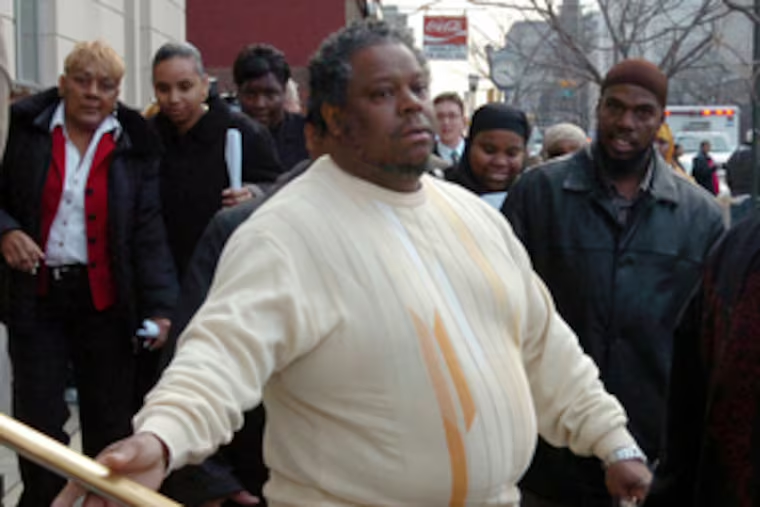Politico behind sex tape is jailed
The former A.C. official was sentenced on unrelated federal corruption charges.

Former Atlantic City Council President Craig Callaway, who was carted off to jail on political corruption charges yesterday, has admitted to the FBI that he was behind the sex-tape blackmail attempt of another council member, according to a federal prosecutor.
The flamboyant political operative, who nearly became mayor of Atlantic City two years ago, engaged in the blackmail scheme while free on bail in the corruption case, Assistant U.S. Attorney Thomas Eicher told a federal judge during Callaway's sentencing hearing in U.S. District Court in Camden yesterday.
The sex tape, which was anonymously distributed to members of the media in November, shows Councilman Eugene Robinson receiving oral sex from a woman in a motel room.
Robinson's attorney said last week that the tape and threats to make it public were used in an attempt to force Robinson to resign from City Council. He refused, and instead contacted authorities, his lawyer said.
Eicher provided an outline of the scheme during yesterday's hearing and offered more details in a memo filed under seal Monday with Judge Joseph Rodriguez. The memo was unsealed after Rodriguez sentenced Callaway to 40 months in prison.
The judge also denied a request that Callaway, 47, be permitted to surrender to federal marshals at a later date and ordered him jailed immediately.
Callaway, however, is expected to be sent back to the Atlantic County area in the near future to answer charges connected to the blackmail scheme, which was investigated by the FBI and then turned over to the Atlantic County Prosecutor's Office.
County Prosecutor Jeffrey S. Blitz declined to comment about the investigation last week. Eicher said he could not provide any additional details.
In his memo, Eicher said Callaway "participated in a scheme which involved hiring a female to lure an Atlantic City City Councilman to a motel to engage in a sex act so that it could be videotaped.
"Callaway and others," the memo continued, "then attempted to use the videotape to blackmail the councilman into resigning as retribution for his perceived political opposition to Callaway and his supporters."
Callaway "has admitted his participation in this conduct to agents of the FBI," the memo added.
As a result, Eicher told Judge Rodriguez, the government was voiding a cooperating agreement that could have resulted in Callaway receiving a lighter sentence.
The blackmail scheme was just one of several bizarre twists in the Callaway case that in many ways epitomizes the down-and-dirty nature of local politics in Atlantic City.
Eicher disclosed yesterday, for example, that Callaway began cooperating with the FBI in 2002 in a corruption investigation, that he secretly recorded conversations and, with FBI approval, accepted bribes from individuals attempting to influence city government.
At the same time, however, he became the target of a separate FBI sting operation in which he took bribes in exchange for promises to steer city work to a contractor who was secretly working for the FBI.
Callaway pleaded guilty and resigned his council post last year after being charged with accepting $36,000 in bribes in the sting operation.
Two other Atlantic City council members and former Camden Councilman Ali Sloan El were nabbed in the same probe.
After pleading guilty last year, Callaway again agreed to cooperate with the FBI and again wore a wire and recorded conversations in an ongoing corruption probe. Eicher said that probe was "fruitful," but declined to comment on whether anyone else had been charged as a result.
At the same time he was cooperating, however, Callaway was cited in a series of municipal court cases for illegally harassing political opponents. And, according to Eicher, he was also involved with setting up the attempted blackmail of a city councilman.
Rodriguez, who made no direct reference to the sex-tape scheme, called political corruption a "malignancy in the bloodstream of democracy" as he imposed the 40-month sentence on Callaway. Sentencing guidelines set a range of 37 to 46 months.
Sloan El and the other two defendants have not been sentenced.
Callaway, in a tearful plea for leniency, asked the judge to consider his work for the "people who have been left out of the process."
Describing himself as "zealous and passionate" and as someone who took an "untraditional route to politics," Callaway said he was trying to do right for the people even as he broke the law.
"What I did was wrong, but I just wanted to try to help people who had been left out," he said, pointing out that the contractor from whom he accepted bribes had promised to offer jobs and contracts to minority members of the community.
Callaway's impassioned plea came before a packed courtroom. Nearly two dozen supporters - several of whom shouted at and shoved reporters and photographers as they accompanied Callaway into the courthouse - sat on one side of the courtroom.
On the other side sat about 40 members of two groups that have opposed Callaway's brand of confrontational politics. They identified themselves as Citizens Against Voter Fraud and Citizens to Restore Fiscal Responsibility in Atlantic City Government.
"Craig Callaway has damaged the image of Atlantic City and injured countless innocent citizens for no other reason than to advance a criminal enterprise while operating under the cover of government," the groups said in a prepared statement released before the hearing.